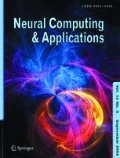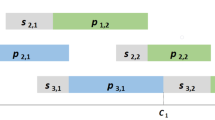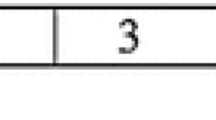Abstract
In this paper, an iterated greedy (IG) heuristic as an intelligent decision-making algorithm is designed for solving a general variant of order scheduling problem with resource allocation. It is assumed that the processing times can be controlled by allocation of a non-renewable common resource, as it is the case in many real-world processes. In order to jointly minimize the number of late orders and the amount of resources consumed, the global criterion as a multiple criteria decision-making method is adapted. Furthermore, a two-layered IG heuristic is devised as solution method. IG heuristic employs a simple but efficient principle and is easy to implement with high capability of evolutionary performance. In suggested IG, a set of solutions is produced by iterating over a greedy construction heuristic by using both destruction and construction functions and then an improving local search is implemented to further enhance the quality of solutions. The simulation experiments show that the proposed IG heuristic is an effective tool in producing high-qualified solutions with respect to the traditional algorithms.









Similar content being viewed by others
References
Pfund M, Fowler JW, Gupta JND (2004) A survey of algorithms for single and multi-objective unrelated parallel-machine deterministic scheduling problems. J Chin Inst Ind Eng 21(3):230–241
Pinedo M (1995) Scheduling theory, algorithms, and systems. Prentice Hall, NJ
Guinet A (1993) Scheduling sequence-dependent jobs on identical parallel machines to minimize completion time criteria. Int J Prod Res 31:1579–1594
Franca P, Gendreau M, Laporte G, Mnller F (1996) A tabu search heuristic for the multiprocessor scheduling problem with sequence dependent setup times. Int J Prod Econ 43:79–89
Lee Y, Pinedo M (1997) Scheduling jobs on parallel machines with sequence dependent setup times. Eur J Oper Res 100:464–474
Kurz M, Askin R (2001) Heuristic scheduling of parallel machines with sequence dependent set-up times. Int J Prod Res 39:3747–3769
Gendreau M, Laporte G, Morais-Guimaraes E (2001) A divide and merge heuristic for the multiprocessor scheduling problem with sequence dependent setup times. Eur J Oper Res 133:183–189
Hurink J, Knust S (2001) List scheduling in a parallel machine environment with precedence constraints and setup times. Oper Res Lett 29:231–239
Eom D, Shin H, Kwun I, Shim J, Kim S (2002) Scheduling jobs on parallel machines with sequence dependent family set-up times. Int J Adv Manuf Technol 19:926–932
Lin C-H, Liao C-J (2004) Makespan minimization subject to flowtime optimality on identical parallel machines. Comput Oper Res 31(10):1655–1666
Dunstall S, Wirth A (2005) Heuristic methods for the identical parallel machine flowtime problem with set-up times. Comput Oper Res 32:2479–2491
Tahar D, Yalaoui F, Chu C, Amodeo L (2006) A linear programming approach for identical parallel machine scheduling with job splitting and sequence dependent setup times. Int J Prod Econ 99:63–73
Anghinolfi D, Paolucci M (2007) Parallel machine total tardiness scheduling with a new hybrid metaheuristic approach. Comput Oper Res 34:3471–3490
Rocha ML, Ravetti MG, Mateus GR, Pardalos PM (2007) Solving parallel machines scheduling problems with sequence-dependent setup times using variable neighborhood search. IMA J Manag Math 18:101–115
Shim S-O, Kim Y-D (2007) Scheduling on parallel identical machines to minimize total tardiness. Eur J Oper Res 177(1):135–146
Biskup D, Herrmann J, Gupta JND (2008) Scheduling identical parallel machines to minimize total tardiness. Int J Prod Econ 115(1):134–142
Tanaka S, Araki M (2008) A branch-and-bound algorithm with Lagrangian relaxation to minimize total tardiness on identical parallel machines. Int J Prod Econ 113(1):446–458
Pfund M, Fowler J, Gadkari A, Chen Y (2008) Scheduling jobs on parallel machines with setup times and ready times. Comput Ind Eng 54:764–782
Yu A-Q, Gu X-S (2008) Coupled transiently chaotic neural network approach for identical parallel machine scheduling. Zidonghua Xuebao Acta Autom Sin 34(6):697–701
Nessah R, Yalaoui F, Chu C (2008) A branch-and-bound algorithm to minimize total weighted completion time on identical parallel machines with job release dates. Comput Oper Res 35(4):1176–1190
Driessel R, Mönch L (2011) Variable neighborhood search approaches for scheduling jobs on parallel machines with sequence-dependent setup times, precedence constraints, and ready times. Comput Ind Eng 61(2):336–345
Hu X, Bao J-S, Jin Y (2010) Minimizing make span on parallel machines with precedence constraints and machine eligibility restrictions. Int J Prod Res 48(6):1639–1651
McCarthy BL, Liu J (1993) A new classification for flexible manufacturing systems. Int J Prod Res 31(2):299–309
Atan MO, Selim Akturk M (2008) Single CNC machine scheduling with controllable processing times and multiple due dates. Int J Prod Res 46(21):6087–6111
Karimi-Nasab M, Fatemi Ghomi SMT (2012) Multi-objective production scheduling with controllable processing times and sequence-dependent setups for deteriorating items. Int J Prod Res 50(24):7378–7400
Nearchou AC (2010) Scheduling with controllable processing times and compression costs using population-based heuristics. Int J Prod Res 48(23):7043–7062
Niu G, Sun S, Lafon P, Zhang Y, Wang J (2012) Two decompositions for the bicriteria job-shop scheduling problem with discretely controllable processing times. Int J Prod Res 50(24):7415–7427
Yildiz S, Akturk MS, Karasan OE (2011) Bicriteria robotic cell scheduling with controllable processing times. Int J Prod Res 49(2):569–583
Nowicki E, Zdrzalka S (1990) A survey of results for sequencing problems with controllable processing times. Discrete Appl Math 26:271–287
Shabtay D, Steiner G (2007) A survey of scheduling with controllable processing times. Discrete Appl Math 155(13):1643–1666
Vickson RG (1980) Two single-machine sequencing problems involving controllable processing times. AIIE Trans 12:258–262
Janiak A (1985) Time-optimal control in a single machine problem with resource constraints. Automatica 22:745–747
Janiak A (1987) One-machine scheduling with allocation of continuously-divisible resource and with no precedence constraints. Kybernetika 23:289–293
Janiak A, Kovalyov MY (1996) Single machine scheduling subjective to deadlines and resource dependent processing times. Eur J Oper Res 94:284–291
Iwanowski D, Janiak A (2002) Optimal resource allocation for single machine scheduling problems with time and resource dependent processing times. Syst Sci 28(2):85–94
Hoogeveen H, Woeginger GJ (2002) Some comments on sequencing with controllable processing times. Computing 68:181–192
Kaspi M, Shabtay D (2004) Convex resource allocation for minimizing the makespan in a single machine with job release dates. Comput Oper Res 31:1481–1489
Shabtay D, Kaspi M (2004) Minimizing the total weighted flow time in a single machine with controllable processing times. Comput Oper Res 31:2279–2289
Kaspi M, Shabtay D (2006) A bicriterion approach to time/cost trade-offs in scheduling with convex resource-dependent job processing times and release dates. Comput Oper Res 33(10):3015–3033
Cheng TCE, Janiak A, Kovalyov MY (2001) Single machine batch scheduling with resource dependent setup and processing times. Eur J Oper Res 135:177–183
Janiak A, Kovalyov MY, Portmann MC (2005) Single machine group scheduling with release dependent setup and processing times. Eur J Oper Res 162:112–121
Ng CT, Cheng TCE, Janiak A, Kovalyov MY (2005) Group scheduling with controllable setup and processing times: minimizing total weighted completion time. Ann Oper Res 133:163–174
Choi B-C, Yoon S-H, Chung S-J (2007) Single machine scheduling problem with controllable processing times and resource dependent release times. Eur J Oper Res 181:645–653
Xu K, Feng Z, Jun K (2010) A tabu-search algorithm for scheduling jobs with controllable processing times on a single machine to meet due-dates. Comput Oper Res 37(11):1924–1938
Choi BC, Leung JY-T, Pinedo ML (2010) Complexity of a scheduling problem with controllable processing times. Oper Res Lett 38:123–126
Wang D, Wang M-Z, Wang J-B (2010) Single-machine scheduling with learning effect and resource-dependent processing times. Comput Ind Eng 59(3):458–462
Wei C-M, Wang J-B, Ji P (2012) Single-machine scheduling with time-and-resource-dependent processing times. Appl Math Model 36:792–798
Józefowska J, Mika M, Waligóra G, Węglarz J (2002) Multi-mode resource-constrained project scheduling problem with discounted positive cash flows—simulated annealing vs. tabu search. Found Comput Decis Sci 27:97–114
Jansen K, Mastrolilli M (2004) Approximation schemes for parallel machine scheduling problems with controllable processing times. Comput Oper Res 31:1565–1581
Al-Fawzan MA, Haouari M (2005) A bi-objective model for robust resource-constrained project scheduling. Int J Prod Econ 96:175–187
Li K, Shi Y, Yang S-L, Cheng B-Y (2011) Parallel machine scheduling problem to minimize the makespan with resource dependent processing times. Appl Soft Comput J 11(8):5551–5557
Janiak A (1988) General flow-shop scheduling with resource constraints. Int J Prod Res 26:1089–1103
Shabtay D, Kaspi M, Steiner G (2007) The no-wait two-machine flow shop scheduling problem with convex resource-dependent processing times. IIE Trans Inst Ind Eng 39(5):539–557
Mokhtari H, Abadi INK, Cheraghalikhani A (2011) A multi-objective flow shop scheduling with resource-dependent processing times: trade-off between makespan and cost of resources. Int J Prod Res 49(19):5851–5875
Mokhtari H, Abadi INK, Zegordi SH (2011) Production capacity planning and scheduling in a no-wait environment with controllable processing times: an integrated modeling approach. Expert Syst Appl 38(10):12630–12642
Jansen K, Mastrolilli M, Solis-Oba R (2005) Approximation schemes for job shop scheduling problems with controllable processing times. Eur J Oper Res 167(2005):297–319
Ying K-C, Lin S-W, Huang C-Y (2009) Sequencing single-machine tardiness problems with sequence dependent setup times using an iterated greedy heuristic. Expert Syst Appl 36:7087–7092
Ying K-C, Lin S-W, Huang C-Y (2009) Sequencing single-machine tardiness problems with sequence dependent setup times using an iterated greedy heuristic. Expert Syst Appl 36(3 PART 2):7087–7092
Ying K-C, Cheng H-M (2010) Dynamic parallel machine scheduling with sequence-dependent setup times using an iterated greedy heuristic. Expert Syst Appl 37:2848–2852
Chang F, Wu J-S, Lee C-N, Shen H-C (2014) Greedy-search-based multi-objective genetic algorithm for emergency logistics scheduling. Expert Syst Appl 41:2947–2956
Balin S (2011) Non-identical parallel machine scheduling using genetic algorithm. Expert Syst Appl 38:6814–6821
Martínez P, Eliceche AM (2011) Bi-objective minimization of environmental impact and cost in utility plants. Comput Chem Eng 35(8):1478–1487
Ruiz R, Stützle T (2007) A simple and effective iterated greedy algorithm for the permutation flowshop scheduling problem. Eur J Oper Res 177:2033–2049
Ruiz R, Stützle T (2008) An iterated greedy heuristic for the sequence dependent setup times flowshop problem with makespan and weighted tardiness objectives. Eur J Oper Res 187(3):1143–1159
Cheng H-M, Ying K-C (2011) Minimizing makespan in a flow-line manufacturing cell with sequence dependent family setup times. Exp Syst Appl 38:15517–15522
Ying K-C (2008) Solving non-permutation flowshop scheduling problems by an effective iterated greedy heuristic. Int J Adv Manuf Technol 38(3–4):348–354
Zhi Y, Armin F, Henning H, Prasanna B, Thomas S, Michael S (2008) Iterated greedy algorithms for a real-world cyclic train scheduling problem. Hybrid metaheuristics. Springer, Berlin, pp 102–116
Hwang & Young-Jou (1994) Fuzzy multiple objective decision making: methods and applications. Springer, Berlin
Holland J (1975) Adaptation in natural and artificial systems. University of Michigan Press, Ann Arbor
Author information
Authors and Affiliations
Corresponding author
Rights and permissions
About this article
Cite this article
Mokhtari, H. Designing an efficient bi-criteria iterated greedy heuristic for simultaneous order scheduling and resource allocation: a balance between cost and lateness measures. Neural Comput & Applic 26, 1085–1101 (2015). https://doi.org/10.1007/s00521-014-1778-7
Received:
Accepted:
Published:
Issue Date:
DOI: https://doi.org/10.1007/s00521-014-1778-7




